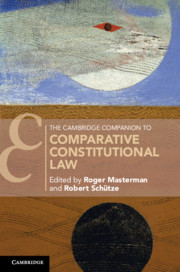Book contents
- Reviews
- The Cambridge Companion to Comparative Constitutional Law
- Cambridge Companions to Law
- The Cambridge Companion toComparative Constitutional Law
- Copyright page
- Contents
- Notes on Contributors
- Acknowledgements
- Table of Cases (Selection)
- Abbreviations
- Introduction
- Part I Theoretical Foundations
- Part II Historical Experiences
- Part III Constitutional Principles
- 8 Democracy
- 9 Separation of Powers
- 10 The Rule of Law
- 11 Human Rights Law
- 12 Federalism
- Part IV State Institutions
- Part V Transnational Constitutionalism
- Index
- References
10 - The Rule of Law
from Part III - Constitutional Principles
Published online by Cambridge University Press: 30 September 2019
- Reviews
- The Cambridge Companion to Comparative Constitutional Law
- Cambridge Companions to Law
- The Cambridge Companion toComparative Constitutional Law
- Copyright page
- Contents
- Notes on Contributors
- Acknowledgements
- Table of Cases (Selection)
- Abbreviations
- Introduction
- Part I Theoretical Foundations
- Part II Historical Experiences
- Part III Constitutional Principles
- 8 Democracy
- 9 Separation of Powers
- 10 The Rule of Law
- 11 Human Rights Law
- 12 Federalism
- Part IV State Institutions
- Part V Transnational Constitutionalism
- Index
- References
Summary
Currently the European Union is in the process of applying certain sanctions in respect of member states that are allegedly in violation of the rule of law (RoL), a fundamental requirement of membership. Sizeable sums of development aid and international loans directed to developing countries are held back for non-observance of the RoL and loans are conditional on satisfying requirements of the RoL. Countries (and international credit rating agencies) measure legal systems against one or another standard of the RoL. The comparative law hypothesis is that there are certain common patterns in the mix of principles, rules and practices that constitute the RoL and within these clusters of patterns certain commonalities emerge. But there has been little systematic comparative study of the RoL in constitutional law, the problem being that what is considered crucial to the RoL in one country is not necessarily required in another. Yet constitutional and international courts, as well as politicians, regularly rely on the concept in adjudication, international treaties and political action. It is therefore a matter of practical importance to understand through comparison what are the common and diverging features of the RoL. Unfortunately, most of the literature on the RoL deals with its normative concepts and not what courts and other servants and masters of the law do with it (or in its name).
- Type
- Chapter
- Information
- The Cambridge Companion to Comparative Constitutional Law , pp. 258 - 290Publisher: Cambridge University PressPrint publication year: 2019

